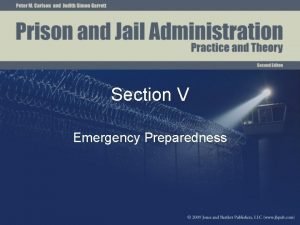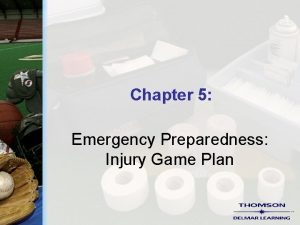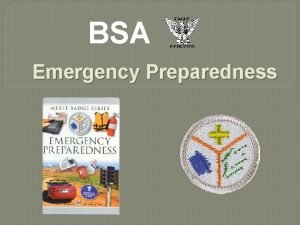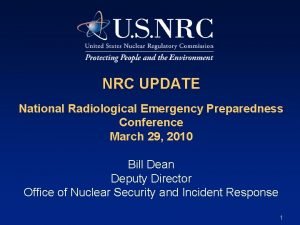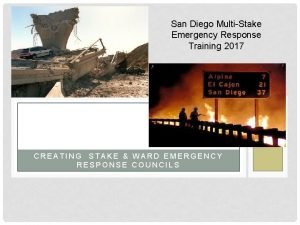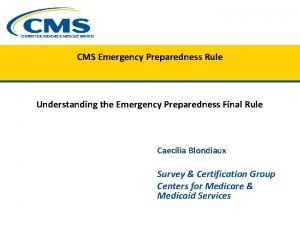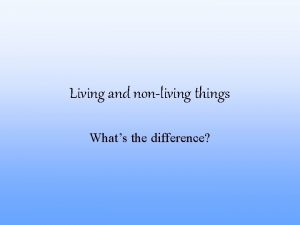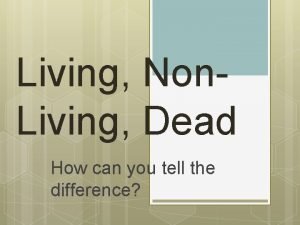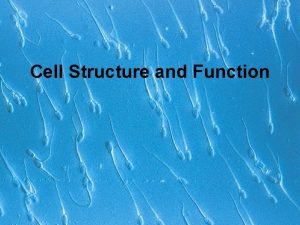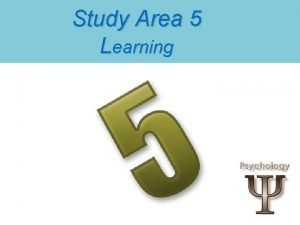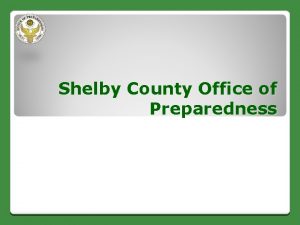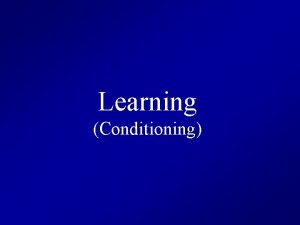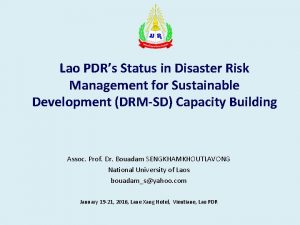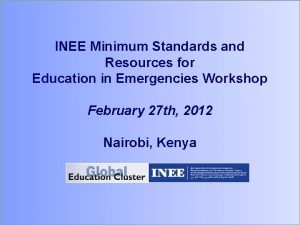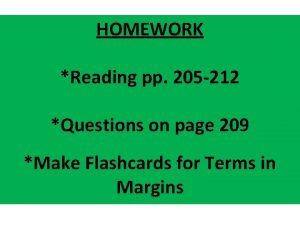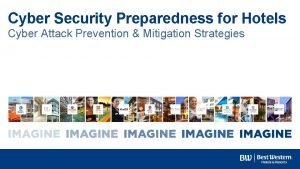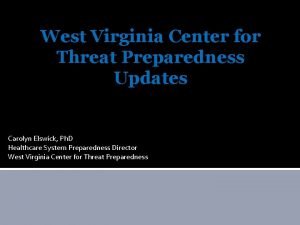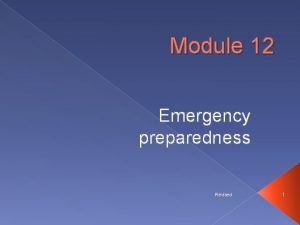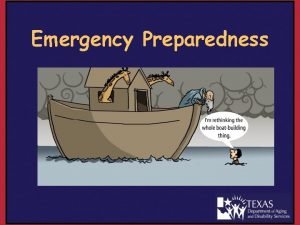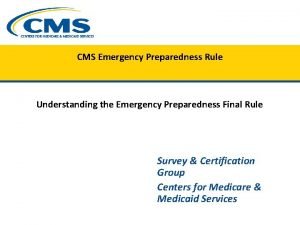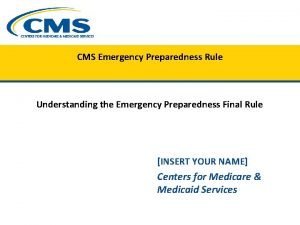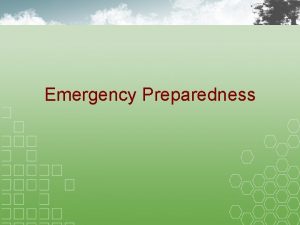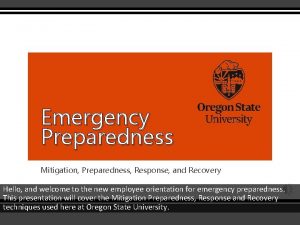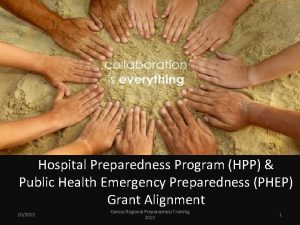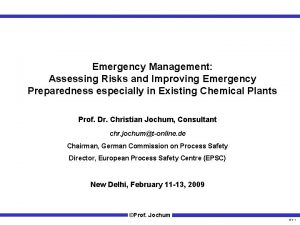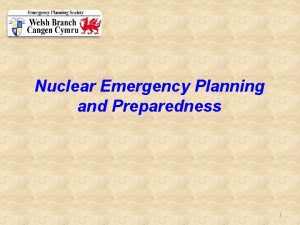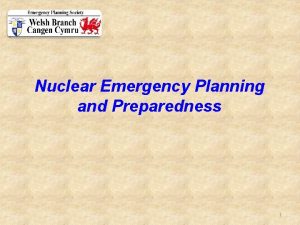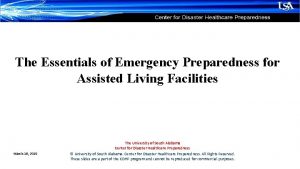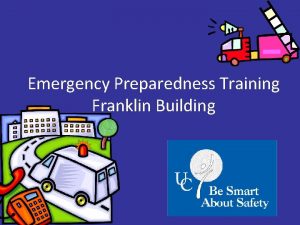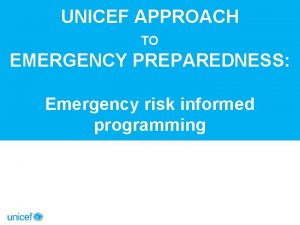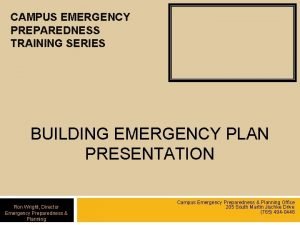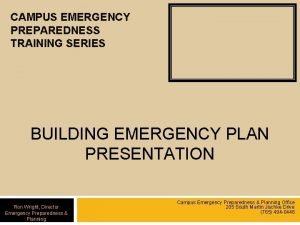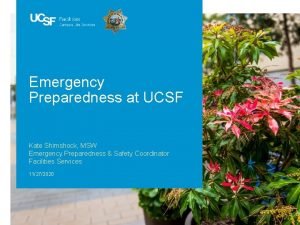Adult CareAssisted Living Associations and Emergency Preparedness Emergency























- Slides: 23

Adult Care/Assisted Living Associations and Emergency Preparedness- Emergency Preparedness at the Facility Level NYC Health Care Coalition Leadership Council February 18, 2016

What are Adult Care Facilities Michele O’Connor NY ALFA – NY Chapter of Argentum

What are ACFS and ALRs?

ACFs - Adult Care Facilities What are ACFs and ALRs? v Offer long- term, residential care with supports and services v Licensed and Regulated by the NYS Department of Health v Cannot directly provide skilled health care or nursing services v 538 Adult Care Facilities in New York State v 79 Adult Care Facilities in New York City v Two base licensure categories: Adult Homes and Enriched Housing Programs

ACFs - Adult Care Facilities What are ACFs and ALRs? Adult Homes: Enriched Housing • Adults over 18 yrs of age Programs: • Private or semi private • Primarily for individuals rooms aged 65 or older • All meals and snacks • Individual apartments • Housekeeping services with kitchenettes • Medication and personal • At least one congregate meal care services • Housekeeping services • Case management • Medication and personal • 24 hour supervision care services • Case management • Limited supervision

v All ALRs are licensed as either Adult Homes or Enriched Housing Programs v. There are three levels of ALR licensure and certification: Types of Assisted Living Residences - ALRs • Basic Assisted Living Residences (ALRs) • Enhanced Assisted Living Residences (EALRs) • Special Needs Assisted Living Residences (SNALRs) v. Basic ALRs provide: • • • Housing All meals and snacks Medication and personal care services Case management services Individualized service plan 24 hour supervision ALRs cannot directly provide nursing services and have limited admission and retention standards

v Licensed ALR with a certificate issued by the Department of Health authorizing the ALR to provide aging in place; Enhanced Assisted Living Residences - EALRs v Allows residents to remain in the community as their health care needs increase, i. e. assistance to climb or descend stairs; v Provide health care services by staff directly employed by the enhanced assisted living residence or by a home care agency, including RNs, LPNs, and HHAs; v It is up to the operator/provider to determine which services the EALR will provide- this allows for provider flexibility and consumer choice.

Special Needs Assisted Living Residences - SNALRs v Licensed ALR with a certificate issued by the Department of Health authorizing the ALR to provide services to residents with special needs, including Alzheimer’s Disease, dementia, or cognitive impairment; v SNALRs must provide a special needs plan which addresses how the special needs of such residents will be safely and appropriately met at such residence; v In order for residents to age in place in an SNALR, and receive health care services, nursing care and treatments, the residence must also be certified as an EALR.

Medicaid Assisted Living Model Assisted Living Programs (ALPs): Assisted Living Program- ALP v Medicaid program designed to provide supportive housing and home care services to individuals who are medically eligible for placement in a nursing facility, but whose needs can be met in a less restrictive and lower cost residential setting. v ALPs are required to possess a Licensed Home Care Services Agency (LHCSA) license. They provide or arrange for resident services including room, board, housekeeping, supervision, personal care, case management and home health services. v ALP residents must not require continual nursing care, be chronically bedfast, or be impaired to the degree that they endanger the safety of other ALP residents.

Characteristics of ACF/AL Residents and the Impact on Emergency Planning and Implementation Empire State Association of Assisted Living (ESAAL) Andrea Cirabisi, Assistant Director

Needs of residents in basic ACF/ALRs (without higher certification) The Admission/Retention Standards most relevant to emergency evacuation planning conversation Person chronically needs physical assistance of another person to transfer, walk or descend stairs Some may have medical equipment that they self-manage (e. g. oxygen enricher – ACF/ALR provider would need to ensure it goes with the resident in evacuation TAL 3 residents Staff will cue and guide out Some slower than others, and staff will provide direct assistance if needed

Special Needs ALR- Memory Care Units for people with Alzheimer’s or cognitive impairment- Units are locked with delayed egress systems In Evacuation situation: Need enough staff to keep residents safe Assist them to safely get into/out of vans/buses and provide supervision In most cases DOH expects receiving facility to also be a secured unit Arrangements made in advance of “sister” facility or an alike stand-alone facility If there are residents in Special Needs ALR that are also in the Enhanced ALR program, residents may need assistance with transfer and walking

Enhanced ALR, Assisted Living Program (ALP) and Hospice Residents Enhanced ALRs and ALPs (Medicaid program) serve residents often above/beyond basic ACF/ALR admission/retention standards Some may be in wheelchairs Again need for higher staffing to assist residents Requirement of smoke stop doors every 100 feet – allows for horizontal evacuation- assistance from Emergency personnel Residents on Hospice at end of life may be moved out on rolling bed if that can be done safely and is in the Hospice Plan of Care

ACFs serving people with serious mental illness (SMI) Some ACFS primarily serve residents with serious mental illness They tend to be indigent Many are younger and fully ambulatory Their psychiatric disability may cause anxiety during emergency, especially in evacuation situations Tend to want to relocate together Alternate evacuation site

ACF/AL Associations Role in Emergency Preparedness New York State Center for Assisted Living (NYSCAL) Carla Erhartic, Director of Provider Support Services

Provide vital communication to all ACFs statewide through an assortment of communication vehicles: emails; member mailings and priority alerts through Constant Contact; designated text alert system managed by our website management company; designated website focusing solely on Communication emergency preparedness with quick links for all types of critical incidents. is a key for success Maintain Excel spreadsheet with current status of all facilities to assist NYS DOH in identifying gaps and needs during an event. Update association website with all documents provided by State and NYC for easy access for any service provider.

Provide training to all ACFs in NYS on the HCS website and develop training tutorials for their use. Promote resources offered thru the grant; ie: PHERN ADP-biological threat program. Training and Resources Promote LTCEMP created to identify gaps, strengthen the ACFs EP capabilities and increase the ACFs knowledge of emergency response and sustainability. Assist in educating providers on e. FINDS and HCS - educational conferences, webinars, audio conferences, and tutorials. Assist ACFs to register with the LMS to enroll for free emergency-related courses.

Participate in NYS DOH OHEP grant for coastal storm planning, participation in HEPCs; and development of resource guides. Collaboration Coordinate annual meetings, training programs through and other resources with meaningful EP-related Grant content for ACFs. Participation Act as a liaison between the State, NYC, DOH and ACF providers during an emergent event when applicable.

Highlights of Our Emergency Preparedness Work. Collaborations at the City and State level Leading Age-New York (LANY) Diane Darbyshire, Senior Policy Analyst

NY State Department of Health (NYS DOH) Office of Health Emergency Preparedness (OHEP) grant with ACF associations Operating for several years Other grants operating to focus on Nursing Home, Home Care sectors Emergency Preparedness Grant Work NYC Department of Health and Mental Hygiene (NYC DOHMH) grant with ACF Associations on Two In its second year Levels Coordination between the two efforts to ensure work is complementary but not duplicative

New York City Focused Grant Initiatives Webinar series offered to all NYC ACFs free of charge Free annual in-person meeting for all NYC ACF providers to: educate and inform critical emergency preparedness topics; update on state and city initiatives; and encourage relationship building and further dialogue. Situational awareness and outreach: Associations have the ability to reach ACFs in various ways Health Commerce System (HCS) accounts Public Health emergency Response Network Auxiliary Distribution Program (PHERN ADP) Long Term Care Emergency Management Program (LTCEMP)

Situational awareness work with State agencies, Health Emergency Preparedness Coalitions (HEPCs), and other associations throughout the continuum. Statewide Grant Initiatives Provide assistance to ACFs with completion of Coastal Storm Surveys during an event. Support during an event: associations will provide support remotely, and can be a conduit for information exchange, data collection, etc. Coalition partnership building activities to better integrate ACFs into regional emergency preparedness & response; HEPC meetings. Develop a webinar for ACFs on Serv. NY to inform providers of the resources available in an event.

The New York State Center for Assisted Living (NYSCAL) Carla Erhartic, Director of Provider Support Services cerhartic@nyscal. org Association Contact Information Leading Age- NY (LANY) Diane Darbyshire, Senior Policy Analyst ddarbyshire@leadingageny. org Empire State Association of Assisted Living (ESAAL) Andrea Cirabisi, Assistant Director acirabisi@esaal. org NY ALFA – NY Chapter of Argentum Michele O’Connor, Legislative and Policy Director moconnor@hodeslandy. com
 Chapter 36 emergency preparedness and protective practices
Chapter 36 emergency preparedness and protective practices Chapter 36 emergency preparedness and protective practices
Chapter 36 emergency preparedness and protective practices Chapter 5 emergency preparedness injury game plan
Chapter 5 emergency preparedness injury game plan Bsa emergency preparedness
Bsa emergency preparedness National radiological emergency preparedness conference
National radiological emergency preparedness conference Stake emergency preparedness plan
Stake emergency preparedness plan Cms emergency preparedness requirements by provider type
Cms emergency preparedness requirements by provider type Difference between living and non living organisms
Difference between living and non living organisms Disaster management
Disaster management Is moss living or non-living
Is moss living or non-living Living non living dead
Living non living dead The smallest living unit of all living things is
The smallest living unit of all living things is What is learning
What is learning Shelby county office of preparedness
Shelby county office of preparedness Biological preparedness
Biological preparedness Conditioning learning
Conditioning learning Conclusion of disaster management
Conclusion of disaster management Preparedness mitigation response recovery
Preparedness mitigation response recovery Biological preparedness
Biological preparedness Do. 27 s. 2015 promoting family earthquake preparedness
Do. 27 s. 2015 promoting family earthquake preparedness Hotel cyber security
Hotel cyber security Biological preparedness
Biological preparedness West virginia center for threat preparedness
West virginia center for threat preparedness Who pip framework
Who pip framework

